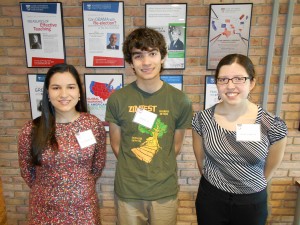
The Mosakowski Institute for Public Enterprise and the George Perkins Marsh Institute, in partnership with the National Oceanic and Atmospheric Administration, have announced their NOAA Fellows for 2013.
Receiving fellowships for the summer are:
- Lucas Earl ’14, a geography major, will work on the project Land-based Influences on the Ecology of Coastal Freshwater and Marine Ecosystems in Puget Sound, Wash. His Clark faculty mentor is Professor Christopher Williams from the Geography Department.
- Faye Harwell ’15 is a biology major whose NOAA project will be Coastal Ecology Research Supporting Ecosystem-based Management in Wells, Maine. Professor Deb Robertson of the Biology Department will serve as Harwell’s faculty mentor.
- Gina Jenkins ’14 is majoring in Environmental Science and Policy and will spend the summer in Seattle studying Pacific Salmon Ecology and Conservation. Her faculty mentor is Professor Karen Frey of Clark’s Geography Department.
- Desiree Jerome ’14 majors in economics and will study Socioeconomic Support for the Office of National Marine Sanctuaries in Silver Spring, Md. Professor Jacqueline Geoghegan of Clark’s Economics Department will serve as Jerome’s mentor.
The Fellows were feted at a luncheon at the Mosakowski Institute on April 30. This is the second year that the Marsh and Mosakowski institutes have partnered with NOAA to offer fellowships to Clark University students.
Rob Johnston, director of the Marsh Institute, noted that the NOAA fellowships are not only “fantastic opportunities” but also provide much-needed service to the federal agency’s research and monitoring of coastal resources. He said the students will be working on projects that “are not in a strait jacket. There is flexibility on many of these projects.”
Jim Gomes, director of the Mosakowski Institute, said new initiatives like the NOAA fellowships and LEEP (Liberal Education and Effective Practice) offer promise for the future.
“My fondest hope is that we provide experiences—whether through coursework, or internships, or fellowships — that you’ll look back on and say, ‘That was one of the best things I did at Clark, and it made a difference for me in the long term,'” he told the students. “We are proud of you and we are excited for you.”
Several 2012 NOAA Fellows were on hand at the April 30 event to offer advice to their counterparts.
Audrey Seiz ’13, who spent last summer in Sandy Hook, N.J. doing studies on the effect of climate on fish, and Karissa Lear ’13, who monitored eelgrasses in Padilla Bay, Wash., urged the new Fellows to engage with the other interns and scientists. “Don’t be afraid to reach out to the senior researchers, and keep a good grasp of those connections,” Seiz said.
Christina Geller ’13, who studied the importance of marine resources to Alaskan fishing communities, said “Don’t be afraid to toot your own horn.” She recalled that it took her four weeks to inform her bosses that she was skilled with a specific type of software. Once she did, “It revolutionized what I was doing on the project.” Geller went on to design a map that appeared in one of the researcher’s books.
“Do your background research before you go, and get as much information you can on the projects you’ll be working on,” advised Lauren Ziemer ’13, who conducted coastal ecology research in Wells, Maine.
Emily Sturdivant ’13, who studied the links between Pacific salmon and the health of basin streams, said that creating an independent project for herself in addition to her fellowship duties would have “put a more personal focus” on her work. She urged the NOAA Fellows to be receptive to the great ideas they’ll be exposed to during the summer. “Talk to everyone,” she said, “and use it.”


